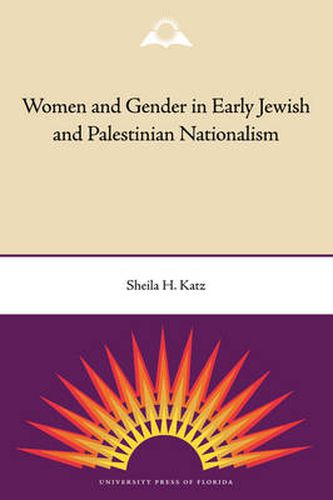Readings Newsletter
Become a Readings Member to make your shopping experience even easier.
Sign in or sign up for free!
You’re not far away from qualifying for FREE standard shipping within Australia
You’ve qualified for FREE standard shipping within Australia
The cart is loading…






This title is printed to order. This book may have been self-published. If so, we cannot guarantee the quality of the content. In the main most books will have gone through the editing process however some may not. We therefore suggest that you be aware of this before ordering this book. If in doubt check either the author or publisher’s details as we are unable to accept any returns unless they are faulty. Please contact us if you have any questions.
In this landmark book, Katz skillfully demonstrates the complex ways that gender ideology was inextricably linked to and reinforced the formation of both Palestinian Arab and Jewish Zionist national identities in the first half of the 20th century. –Sherna Berger Gluck, California State University
This is the only historical study in which the discourse of both Arabs and Jews is the centerpiece and that discourse is analyzed as undergirding the construction of nascent ideologies… . The text is a marvelous synthesis of the many conflicting narratives about Palestine in the years leading up to Israeli statehood. –Lisa Pollard, University of North Carolina, Wilmington
This book makes a significant contribution to Middle Eastern and women’s history scholarship. It is unique to find the cases of these two nationalist movements treated simultaneously in this way, in this period. It is an intriguing interweaving of the gendered narratives. –Palmira Brummett, University of Tennessee
Drawing on a variety of source materials, ranging from popular print media to poetry, film, political treatises, and biographies and autobiographies, Sheila Katz examines the ways in which gender operated in forming the political identities of Palestinian Arabs and Jewish Zionists. By exploring both gender definitions and their expressions in the everyday lives of two contesting peoples, she provides a highly nuanced understanding of how gender affects the discourse of conflict between two competing national movements. Through this balanced discussion of the histories of Jewish and Palestinian women during Palestine’s formative years, Katz makes a significant contribution to scholarship in Middle Eastern and women’s history.
Working at the intersection of several disciplines, Katz provides a wide-ranging examination of the formation and expression of national identity and the changing gender roles that help shape it. She uses gender as a tool to examine the creation of boundaries and power relations among nations. Through a discussion employing the materials and methods of history, sociology, literary criticism, and anthropology, this study offers a unique examination of identity formation in Palestine during the first half of the 20th century and an analysis of both Palestinian and Jewish women in their respective national movements, illuminating gender as a linchpin of international conflict.
$9.00 standard shipping within Australia
FREE standard shipping within Australia for orders over $100.00
Express & International shipping calculated at checkout
This title is printed to order. This book may have been self-published. If so, we cannot guarantee the quality of the content. In the main most books will have gone through the editing process however some may not. We therefore suggest that you be aware of this before ordering this book. If in doubt check either the author or publisher’s details as we are unable to accept any returns unless they are faulty. Please contact us if you have any questions.
In this landmark book, Katz skillfully demonstrates the complex ways that gender ideology was inextricably linked to and reinforced the formation of both Palestinian Arab and Jewish Zionist national identities in the first half of the 20th century. –Sherna Berger Gluck, California State University
This is the only historical study in which the discourse of both Arabs and Jews is the centerpiece and that discourse is analyzed as undergirding the construction of nascent ideologies… . The text is a marvelous synthesis of the many conflicting narratives about Palestine in the years leading up to Israeli statehood. –Lisa Pollard, University of North Carolina, Wilmington
This book makes a significant contribution to Middle Eastern and women’s history scholarship. It is unique to find the cases of these two nationalist movements treated simultaneously in this way, in this period. It is an intriguing interweaving of the gendered narratives. –Palmira Brummett, University of Tennessee
Drawing on a variety of source materials, ranging from popular print media to poetry, film, political treatises, and biographies and autobiographies, Sheila Katz examines the ways in which gender operated in forming the political identities of Palestinian Arabs and Jewish Zionists. By exploring both gender definitions and their expressions in the everyday lives of two contesting peoples, she provides a highly nuanced understanding of how gender affects the discourse of conflict between two competing national movements. Through this balanced discussion of the histories of Jewish and Palestinian women during Palestine’s formative years, Katz makes a significant contribution to scholarship in Middle Eastern and women’s history.
Working at the intersection of several disciplines, Katz provides a wide-ranging examination of the formation and expression of national identity and the changing gender roles that help shape it. She uses gender as a tool to examine the creation of boundaries and power relations among nations. Through a discussion employing the materials and methods of history, sociology, literary criticism, and anthropology, this study offers a unique examination of identity formation in Palestine during the first half of the 20th century and an analysis of both Palestinian and Jewish women in their respective national movements, illuminating gender as a linchpin of international conflict.